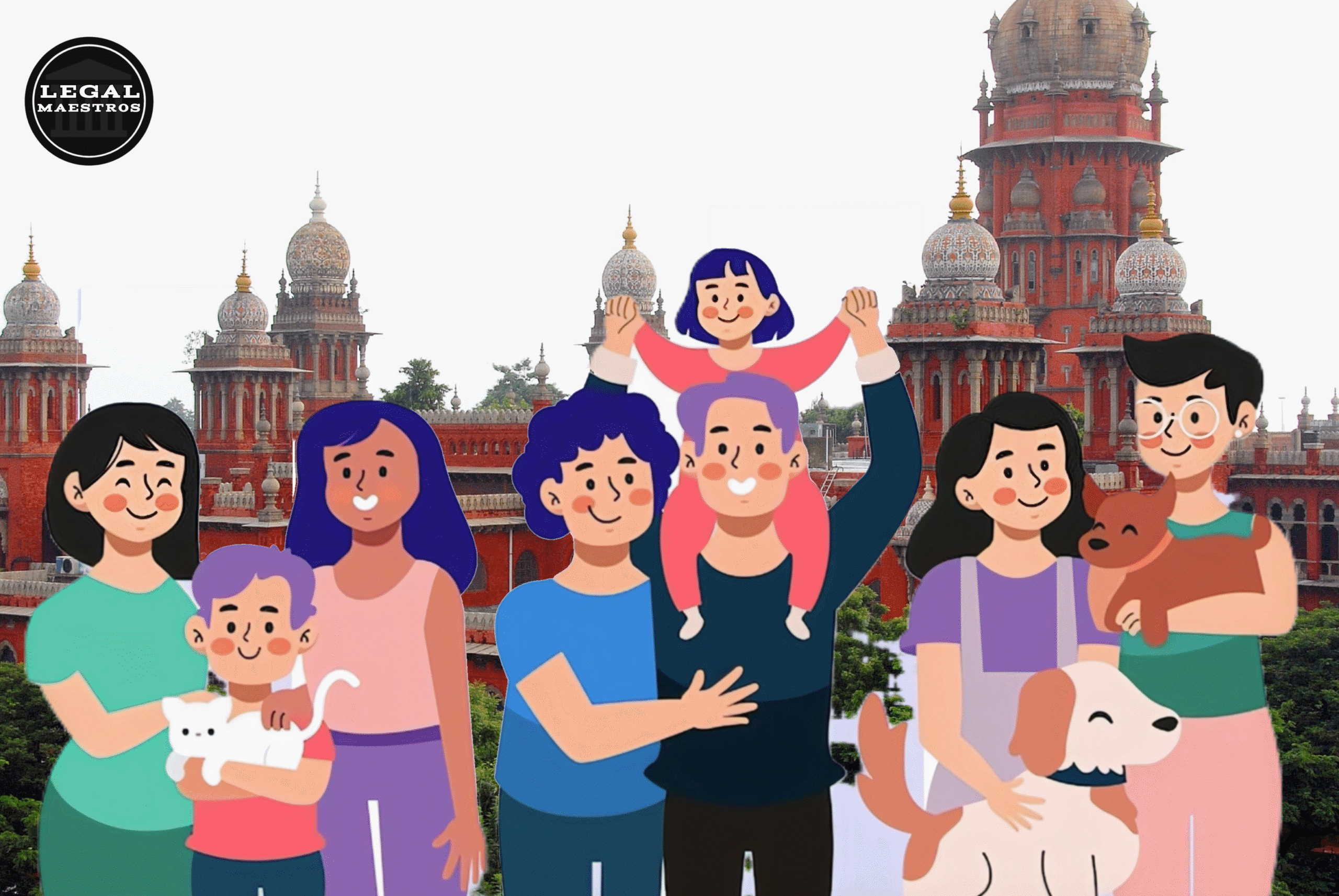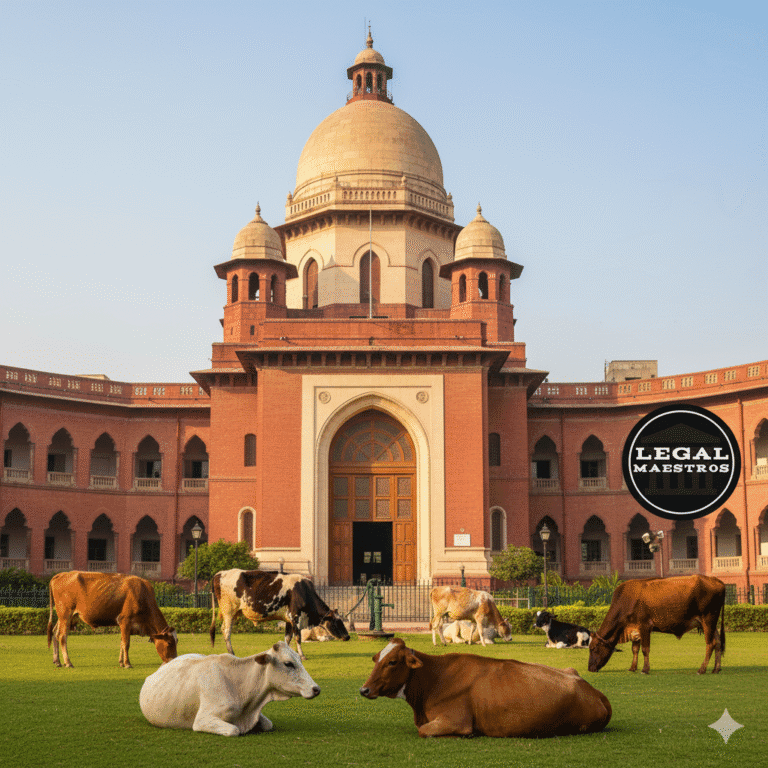
A major verdict that affirms the freedom of LGBTQ+ persons to build families of their choosing was issued by the Madras High Court. The court made the observation that while marriages between people of the same gender are not legally recognized in India, queer couples are entirely allowed to form families and live together.
In response to a habeas corpus petition that was submitted by a woman who was seeking the freedom of her lesbian partner from what was said to be unlawful custody by her birth family, the judge issued the conclusion.
This decision was handed down on May 22, 2025, in the case of High Court of Pakistan No. 990 of 2025, by a bench that included Justice G.R. Swaminathan and Justice V. Lakshminarayanan together.
For any queries or to publish an article or post or advertisement on our platform, do call at +91 6377460764 or email us at contact@legalmaestros.com.
According to the court’s decision, same-sex partnerships that are based on mutual consent are protected by the Indian Constitution. Additionally, the court ruled that those who identify as LGBTQ+ should be permitted to express their liberty without being subjected to compulsion from family members or the state.
Histories of the Case
In accordance with Article 226 of the Constitution, the petitioner, M.A., filed a plea with the Madras High Court, requesting that her partner, D, who is 25 years old, be released from what she said was illegal imprisonment by D’s father.
The person who submitted the petition said that D was brought against her will to her family’s residence, where she was beaten, subjected to ritual activities that were intended to “correct” her sexual orientation, and was barred from exercising her liberty of choice.
For any queries or to publish an article or post or advertisement on our platform, do call at +91 6377460764 or email us at contact@legalmaestros.com.
D was brought before the court together with her mother after the court issued a summons to produce her.
During a private conversation with the Bench, D unequivocally declared that she was a lesbian, that she was in a relationship with the petitioner that was based on mutual consent, and that she desired to reside with her partner. She went on to reveal that her biological family had imprisoned her against her choice and that they were concerned for her safety.
Supreme Court’s Principles That Should Be Practiced
The Bench adhered to the standards that were established by the Supreme Court in the case of Devu G. Nair vs. State of Kerala (2024). These guidelines advise the courts to ensure that members from the LGBTQ+ community are provided with a secure and conducive atmosphere in which they may express their free will during such proceedings.
For any queries or to publish an article or post or advertisement on our platform, do call at +91 6377460764 or email us at contact@legalmaestros.com.
The court emphasized that under no circumstances should any kind of coercion, counseling, or undue influence be permitted during the contact between the court and the individual in question.
It was clear that the judges had a deep comprehension of these concepts, as shown by the fact that they maintained a private conversation with D in order to guarantee that her choice was free and voluntary.
Following the court’s consideration of her remarks, which were consistent and unambiguous, the decision was made to release her from the care of her family.
For any queries or to publish an article or post or advertisement on our platform, do call at +91 6377460764 or email us at contact@legalmaestros.com.
The foundations of both international law and constitutional law
The decision of the court went beyond the particulars of the case and made a statement that reaffirmed more general legal principles.
The Bench declared that individuals who identify as LGBTQ+ have the right to privacy, security, and the ability to create families of their choosing. They cited the Yogyakarta Principles, which are a set of guidelines that govern the application of international human rights law to sexual orientation and gender identity.
The judges affirmed that sexual orientation and gender identity are matters of individual choice, autonomy, and dignity, and that they fall squarely within the ambit of Article 21 of the Constitution.
For any queries or to publish an article or post or advertisement on our platform, do call at +91 6377460764 or email us at contact@legalmaestros.com.
With reference to Supreme Court precedents such as NALSA v Union of India (2014), Navtej Singh Johar v Union of India (2018), and Deepika Singh v Central Administrative Tribunal (2022), the judges made this assertion.
Despite the fact that the Supreme Court’s decision in Supriyo @ Supriya Chakraborty v Union of India (2023) did not legalize marriages between people of the same gender, the Bench made the observation that gay couples are nonetheless permitted to create families and cohabit.
Furthermore, the court noted the rising acknowledgment of the idea of “chosen family” within the realm of LGBTQ+ law.
For any queries or to publish an article or post or advertisement on our platform, do call at +91 6377460764 or email us at contact@legalmaestros.com.
Objections against the inaction of the police
A strong position was also taken against the indifference of the police in responding to the petitioner’s allegations, which was reflected in the ruling. Regarding the inability of the jurisdictional police to take action in response to several SOS messages and a written complaint that was submitted on May 5, 2025, the court issued a warning.
It has been stated that the police violated D’s autonomy and right to self-determination by compelling her to accompany her parents without her consent.
The court emphasized that the right to personal security puts a comparable obligation on the state, and it reminded government personnel, notably police officers, of their need to react to complaints from LGBTQIA+ individuals in a prompt and sensitive manner.
For any queries or to publish an article or post or advertisement on our platform, do call at +91 6377460764 or email us at contact@legalmaestros.com.
The Bench made a profound insight when it observed that the acceptability of LGBTQ+ partnerships in society is still very low or nonexistent. It contrasted the supporting attitude of people such as the late Justice Leila Seth, who had openly backed her homosexual son, with the widespread rejection and animosity expressed by many families.
This was done in order to highlight the differences between the two. The justices made the observation that while D’s mother, like many other parents, had a difficult time accepting her daughter’s orientation, this emotional discomfort could not be allowed to take precedence over D’s fundamental rights.
The court went on to comment on the improper usage of terminology such as “queer,” pointing out that labels of this kind should not give the impression that non-heterosexual inclinations are pathological.
For any queries or to publish an article or post or advertisement on our platform, do call at +91 6377460764 or email us at contact@legalmaestros.com.
In the verdict, it was emphasized that the persons in question are entirely normal in terms of their sexual orientation, and that society and the law need to recognize them as such.
The court granted D’s petition for habeas corpus, which resulted in her being released from custody and preventing her relatives from meddling with her personal life. In addition to this, it issued a writ of continued mandamus, which instructed the police officials in the jurisdiction to provide protection to D and the petitioner whenever it was necessary.
The decision serves as a significant confirmation of LGBTQ+ rights in India and brings to light the increasing role of the judiciary in protecting individual autonomy and dignity in the face of demands from society and families.
For any queries or to publish an article or post or advertisement on our platform, do call at +91 6377460764 or email us at contact@legalmaestros.com.
The Madras High Court’s decision makes it very obvious that LGBTQ+ couples do, in fact, have the right to create families and live together without restriction, even while the legal recognition of same-sex marriage is still in the process of being ratified.






![Research Assistantship @ Sahibnoor Singh Sindhu, [Remote; Stipend of Rs. 7.5k; Dec 2025 & Jan 2026]: Apply by Nov 14, 2025!](https://legalmaestros.com/wp-content/uploads/2025/11/Gemini_Generated_Image_s0k4u6s0k4u6s0k4-768x707.png)
![Karanjawala & Co Hiring Freshers for Legal Counsel [Immediate Joining; Full Time Position in Delhi]: Apply Now!](https://legalmaestros.com/wp-content/uploads/2025/11/Gemini_Generated_Image_52f8mg52f8mg52f8-768x711.png)